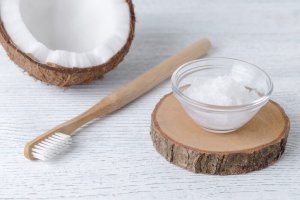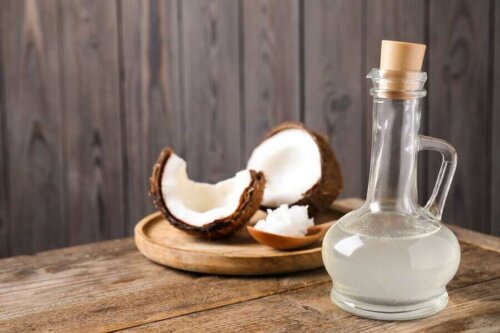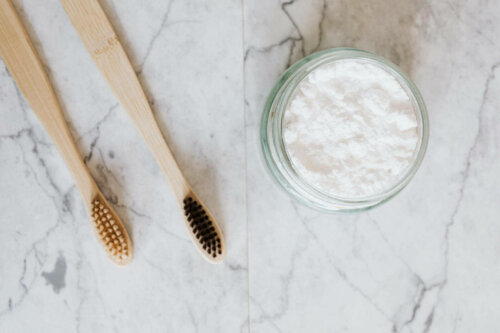Improve Your Oral Health with Coconut Oil

Coconut oil is a natural product with several uses. Some people have even cataloged it as a “superfood” because it contains antioxidants and several nutrients that benefit your health in different areas such as oral health.
This product has been used for some time as a side treatment, since it’s considered to have the potential to care for teeth and gums and prevent and treat some problems, such as cavities, dental infections, and gingivitis.
Effectiveness of coconut oil on your oral health

In general terms, coconut oil is said to fight dental infections caused by bacteria thanks to its lauric acid content. Additionally, it whitens the enamel, without damaging it, and prevents tartar. Moreover, it reduces gum inflammation and prevents swelling and bleeding.
Now, let’s see what the most recent studies have to say about it:
- In another study published in 2017, coconut oil mouthwashes are an effective method for oral hygiene maintenance, as it significantly reduces the presence of Streptococcus mutans in saliva.
- According to a study published in 2018, it was concluded that coconut oil can help reduce plaque and gingivitis, so it can be used as an effective antibacterial and antifungal product.
Treatments to improve your oral health
We recommend choosing extra virgin coconut oil for this natural home treatment. The oil becomes solid at temperatures below 75ºF but will return to a liquid once it comes in contact with your body heat.
The treatment we propose today is based on two steps. You should be sure to follow it consistently every day to get the best results and maintain good oral health:
- In the morning: rinse or swish
- At night: brush as you would with your regular toothpaste
1. Daily rinses
Daily rinses or swishing with coconut oil is an ancient technique to improve the health of your mouth and your entire digestive system. While you can choose to use sesame oil for this purpose, we suggest using extra virgin coconut oil thanks to its antibacterial properties.
Rinsing with coconut oil promotes deep cleansing of the mouth and helps balance your digestive tract.
This effectively eliminates bacteria and toxins without altering the delicate pH of your mouth. You’ll also eliminate tartar, improve your breath, and reduce inflammation of the gums.
How to do them

- Before you have breakfast, place one tablespoon of extra virgin coconut oil in your mouth. Secondly, make sure the oil is of the highest quality available.
- Then, begin to rinse and spread the oil around your entire mouth. However, don’t gargle. This is to prevent the oil from going down your throat.
- Then, try to rinse for about 20 seconds. During this time, you’ll notice that the dense texture of the oil becomes lighter and more watered down, which is a good sign.
- Spit out the oil and then brush your teeth thoroughly using your regular toothpaste
- We recommend waiting at least 15 more minutes before breakfast and always start with a glass of water to help eliminate any toxins from the body
- Finally, repeat this every morning
Read about the Ten Beauty Benefits of Coconut Oil
2. Natural toothpaste
To keep your mouth healthy and resistant to dental infections, we suggest choosing only natural toothpaste options. This will help you avoid sulfates, fluorine, and other additives that can affect your health and alter the pH of your saliva.
Some effective natural alternatives contain vegetable and essential oils, clay, activated charcoal, and more.

Always brush your teeth after each main meal. To reinforce your regular brushing, replace your toothpaste with coconut oil at least once a day.
Overall, coconut oil can become a complementary natural toothpaste to strengthen the natural defenses of your mouth. Furthermore, you’ll be able to see results quickly.
All cited sources were thoroughly reviewed by our team to ensure their quality, reliability, currency, and validity. The bibliography of this article was considered reliable and of academic or scientific accuracy.
- (2016). Oil pulling for maintaining oral hygiene – A review. Journal of traditional and complementary medicine, 7(1), 106-109. doi:10.1016/j.jtcme.2016.05.004
https://www.ncbi.nlm.nih.gov/pmc/articles/PMC5198813/ - Peedikayil, F. C., Sreenivasan, P., & Narayanan, A. (2015). Effect of coconut oil in plaque related gingivitis – A preliminary report. Nigerian medical journal : journal of the Nigeria Medical Association, 56(2), 143-7.
https://www.ncbi.nlm.nih.gov/pmc/articles/PMC4382606/ - Aylıkcı, B. U., & Colak, H. (2013). Halitosis: From diagnosis to management. Journal of natural science, biology, and medicine, 4(1), 14-23.
https://www.ncbi.nlm.nih.gov/pmc/articles/PMC3633265/ - Effect of oil pulling on plaque induced gingivitis: a randomized, controlled, triple-blind study (2009). Asokan S, Emmadi P, Chamundeswari R.
https://www.ncbi.nlm.nih.gov/pubmed/19336860 - Comparison of antibacterial efficacy of coconut oil and chlorhexidine on Streptococcus mutans: An in vivo study. Peedikayil FC, Remy V, John S, Chandru TP, Sreenivasan P, Bijapur GA.
https://www.ncbi.nlm.nih.gov/pubmed/27891311 - Antimicrobial property of lauric acid against Propionibacterium acnes: its therapeutic potential for inflammatory acne vulgaris. Nakatsuji T1, Kao MC, Fang JY, Zouboulis CC, Zhang L, Gallo RL, Huang CM.
https://www.ncbi.nlm.nih.gov/pubmed/19387482
This text is provided for informational purposes only and does not replace consultation with a professional. If in doubt, consult your specialist.








